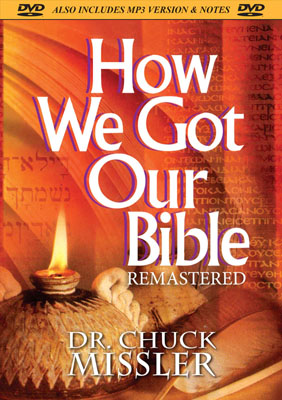Then said I, Lo, I come: in the volume of the book it is written of me,
— Psalm 40:7
The Bible is the single most important book of all time, selling an estimated 5 billion copies. It has been translated into 349 languages, and 2123 languages have at least one book of the Bible. At the same time, the Bible is scrutinized and attacked more than any other book in the world. It has been outlawed, confiscated and burned at different times and places in history. It has been smuggled into jail cells and across borders. John Huss was burned at the stake for teaching from the Bible as the final authority for the Church over any earthly church rulers. William Tyndale was strangled and burned for translating the Bible into English. Every week, millions of Christians gather to discuss its words, even as “higher” critics attempt to explain it through the lens of metaphysical naturalism. What we believe about the Bible can be the most important, central issue in our lives, threading its way into the very fabric of who we are and how we live each day.
Where did the Bible come from? Why do we believe its origin is supernatural? Who defined the canon of Scripture? Most importantly, is the Bible the Word of God? You and I are gambling our eternity on the answer to that last question. Why do we believe God is the author of the Bible, and can each one of us defend that belief? Dark times are on the horizon, and it is increasingly important that we learn to live by faith. Where we place our faith fully depends on how we view the Scriptures.
Over the past 50 years, I have been privileged to travel around the world and talk to people about the Word of God and the saving power of Jesus Christ. Of course, I always get a lot of questions about the Bible. People ask me: “Chuck, how do I know the Bible is the Word of God?” “How do I know the Bible is true and accurate?” “How did we even get the Bible we have today?” “Which version of the Bible is the best?”
The purpose of our briefing pack How We Got Our Bible, now available in book format, is to deal with these questions and to assure its readers that the Bible is reliable, accurate, and applicable to the world today. Through it’s pages, we will explore some lesser-known facts about the Bible and take common knowledge about its pages to a deeper level. We will defend the authenticity of the Bible as the Word of God so that you, dear reader, might equip others to do the same. The Word of God is a miracle the Lord has given to us so that we may know Him better and live our lives according to Truth.
The Nature of Reality
Within recent years, many members of Protestant denominational churches and the Roman Catholic Church have turned away from the Bible as the fully inspired Word of God.
We hear arguments that the Bible contradicts itself or that it contradicts the “truths” of modern culture and science. Many people say the Bible contains the Word of God, but cannot be relied on to be the Word of God in all its entirety. This is a key issue. Is the Bible really true?
Two World Views
Ultimately, there are two basic world views we can hold. One view regards everything we experience as the result of some cosmic accident. “In the Beginning there was nothing, and then it exploded.”
The other view is that everything we experience is the deliberate result of a Creator. Of course, there are numerous variations on each of these views, but each of us must decide where we will place our trust. Each of these world views holds possible solutions to the biggest puzzles of life:
- Who am I?
- Where did I come from?
- Where am I going?
- To whom am I accountable?
It is ultimately important that we find the true answers to these questions.
Rejection of Authority
You and I live in a time of rebellion and self-worship. Parental and marital authority are challenged in the homes and courts. Political, academic and ecclesiastical authority are challenged across the land.
Now the serpent was more subtle than any beast of the field which the LORD God had made. And he said unto the woman, Yea, hath God said, Ye shall not eat of every tree of the garden?
— Genesis 3:1
Here, near the very beginning, we are introduced to Satan, the serpent, our adversary, and the first thing we see him do is question God’s Word. “Yea, hath God said?”
His next step is to slander God’s character with straight denial. “Ye shall not surely die,” (Gen 3:4). Thus, Satan encouraged the rejection of God’s authority at the very beginning, while humanity was yet in its infancy. Eve failed to trust God, Adam followed her in directly disobeying what God had told him, and humankind lost everything as a result.
We find the same pattern today. A number of social indicators deteriorate rapidly after 1963 in the United States. There were fewer than 10 births per 1000 unmarried teen women (ages 15–19) prior to 1947, and between 1955 and 1964, the number remained steadily between 15 and 16.[1] After 1964, however, the numbers of teenagers giving birth out of wedlock climbed steadily during the next 30 years to more than 46 births per 1000 teen women in 1994.[2] Divorce rates escalated, families broke up, crime rates rose, and the acceptance of homosexuality became commonplace. As of 2015, more than 58 million unborn children have been murdered in the United States because they were considered inconvenient. Fifty-eight million. That is nearly ten times the number of Jewish victims in the Holocaust.
It’s noteworthy that in 1963, as a result of the combined court cases Abington School District v. Schempp and Murray v. Curlett, the U.S. Supreme Court banned school-led reading of the Bible and recital of the Lord’s Prayer. These court cases alleged to uphold the principles of freedom and human dignity, yet the end result of turning our backs on God has been destruction and misery. As we choose our own way over God’s way, we’re losing everything. There is little dignity in divorce or high crime rates.
It is ironic that the elements we most desire in life are rarely attained through our own weak wisdom and fleshly desires. After trying our own methods, over and over again we have had to learn that we experience human dignity and true freedom only through moral obedience and accountability to the Creator who fashioned human beings for a high spiritual destiny.
Facing the Skeptics
Skeptics have brutally attacked the Bible throughout history, and during the past century it has become popular among intellectuals to regard the Bible as merely a conglomeration of Jewish writings. It’s considered respectable to dispute the authorship of the books of the Bible and to disregard fulfilled prophecy as events reported after-the-fact.
In 1898, Hermann Schultz, professor of Theology at the University of Gottingen, declared:
Of the legendary character of the pre-Mosaic narrators, the time of which they treat is a sufficient proof. It was a time prior to all knowledge of writing, a time separated by an interval of more than four hundred years, of which there is absolutely no history.[3]
Yet, the patriarchal accounts in the Bible have been corroborated by archeological evidence.[4] The information we have of Abraham, Isaac and Jacob matches the culture we know of that time in history.[5] Job, the contemporary of Abraham, had the ability to write.[6] Sumerian cuneiform writing certainly predates Moses by much more than 400 years; Ira Spar at the Metropolitan Museum of Art notes that, “By the middle of the third millennium B.C., cuneiform primarily written on clay tablets was used for a vast array of economic, religious, political, literary, and scholarly documents.”[7] The old criticism that no written language existed in Moses’ day has been proven to be false.[8] The theories that the Gospels and the Epistles were written in the second century, over a hundred years after the fact, have been shredded and refuted by archeological discoveries, documentary discoveries and competent analysis.[9] The common skeptical assertions thrown about in “academic” circles can be shown to be short-sighted.
We will go into these things in more depth as we continue through this book.
God-Breathed
As we read the Bible, we find there are a number of highly significant verses found at the address “3:16.”
For God so loved the world, that he gave his only begotten Son, that whosoever believeth in him should not perish, but have everlasting life.
— John 3:16
Hereby perceive we the love of God, because he laid down his life for us: and we ought to lay down our lives for the brethren.
— 1 John 3:16
Know ye not that ye are the temple of God, and that the Spirit of God dwelleth in you?
— 1 Corinthians 3:16
All scripture is given by inspiration of God, and is profitable for doctrine, for reproof, for correction, for instruction in righteousness:
— 2 Timothy 3:16
2 Timothy 3:16 is one of these significant “3:16” verses — a little fact that makes it easy to remember its address. This particular verse gives us a foundational message, and we should read it carefully and take it to heart:
“All scripture is given by inspiration of God…” Note this verse says, “All Scripture” — not just certain passages that we might select because we like them best. If we accept only those parts of the Bible that suit us and reject the others, then we are believing in ourselves and our own (unreliable) judgment rather than in the Scripture.
The word “inspiration” in the Greek, θεόπνευστος — theopneustos — means “God-breathed.” That is, the Scriptures were not just influenced by good ideas about God; they were actually infused into human beings by the Spirit of God, who breathed into the hearts and minds of the Bible’s authors.
All Scripture “is profitable for doctrine, for reproof, for correction.” Doctrine is about teaching correct understanding while reproof is involved in addressing wrong conduct and correction deals with wrong understanding. As we study the epistles of Paul, for example, we discover that while Romans is a doctrinal statement of Soteriology (the study of salvation), 1 Corinthians was sent to reprove wrong conduct and Galatians to correct wrong doctrine. Again, Ephesians presents the doctrine of Ecclesiology (the study of this mystical thing we call the “Church”), while Philippians then presents the reproof and Colossians presents the correction for the Church. 1 and 2 Thessalonians present the doctrine of Eschatology (the study of the last things), and 1 and 2 Peter and Revelation continue that theme.
The more we study the Bible, the more we discover that it’s very well organized specifically for its purposes.
This excerpt is from Dr. Chuck Missler’s book How We Got Our Bible, available in print and eBook. Also available in Kindle format from Amazon. May God bless each one of us as we absorb this material and press onward to live it out every day.
Notes:
- CDC. (2001). Births to Teenagers in the United States, 1940–2000. National Vital Statistics Reports, 49(10), 10. ↩
- Ibid. ↩
- Schultz, H. (1898). Old Testament Theology (4th ed., pp. 25–26) (J.A. Patterson, Trans.). Edinburgh: T. & T. Clark. ↩
- See, for instance, Albright, W. (1938, April). Archaeology Confronts Biblical Criticism 186; Free, J. & Howard F. (1992). Archaeology and Bible History. Grand Rapids, MI: Zondervan; and Jackson, W. (1982). Biblical Studies in the Light of Archaeology. Montgomery, AL. Apologetics Press ↩
- For instance, the Hittites under Muwattalis beat Egyptian Pharaoh Rameses II at Kadesh about 1300 B.C. They were in Canaan, and Abraham’s purchase of a grave for Sarah as described in Genesis 23 is historically accurate. See Hamilton, V. (1995). The book of Genesis: Chapters 18–50 (pp. 126–131). Grand Rapids, MI: Wm. B. Eerdmans. ↩
- Job 19:23, 24; 31:35 ↩
- Spar, I. (2000). The Origins of Writing. In Heilbrunn Timeline of Art History. New York: The Metropolitan Museum of Art. https://www.metmuseum.org/toah/hd/wrtg/hd_wrtg.htm Last accessed December 15, 2015. ↩
- That Moses wrote the Pentateuch is first recognized in the fact that he said he did, and that all Bible authors recognize this in the years and centuries that followed. Exodus 17:14; 24:4; 34:27; Numbers 33:1–2; Deuteronomy 31:9–11; Joshua 1:8; 8:31–32; 1 Kings 2:3; 2 Kings 14:6; 21:8; Ezra 6:18; Nehemiah 13:1; Daniel 9:11–13; Malachi 4:4; Matthew 19:8; Mark 12:26; John 5:45–47; 7:19; Acts 3:22; Romans 10:5. ↩
- See, for instance, Robinson, J. (1976). Redating the New Testament. Eugene, OR: Wipf and Stock. ↩







